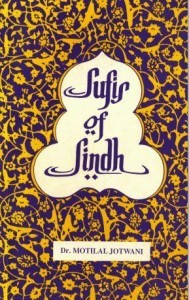
The ideal of futuwwa, or brotherhood, which was at the basis of many associations devoted to the spread of ‘purity, generosity, service of neighbor or stranger” in the pre-Islamic Arabia seems to have been adhered to the Arabian mystics before the end of the second century or at the beginning of the ninth century A.D. These mystics came to be called Sufis. The etymology of the term “Sufi” is not certain. According to some scholars, the word is connected with safi, the pure. The more general view refers it to suf or coarse wool, as these mystics used to wear woolen garments. The Sufis, being in the general framework of the shari ‘ah, the correct practice of the Quranic beliefs, followed different individual paths, or tariqah, for their spiritual endeavor. These individual differences clearly shows in this book portraying a number of Sufis from the Sindh region. The author, Dr. Jotwani was considered as one of the great research scholars of Sindhi language in India and Pakistan. He had received many awards for his literary works.
Download Sufis of Sindh here (228 pages/12 MB):
 Sufis of Sindh
Sufis of Sindh
Who were the Sufis?
Sufis are Islamic mystics. They seek a direct personal experience of God through prayer and asceticism, rather than relying solely on religious texts and doctrines. Sufism has a long history in Islam, with roots in the early days of the religion, and has played an important role in the development of Islamic culture and spirituality. Sufis have often been associated with the spread of Islam in many parts of the world, and have been known for their poetry, music, and storytelling.

